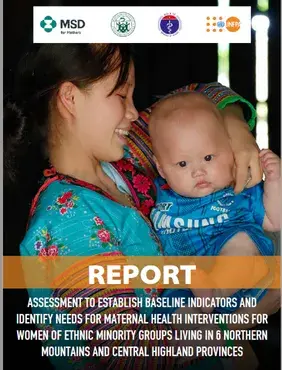Although Viet Nam has made significant progress in improving sexual and reproductive health of the general population, disparities and inequalities remain in access to and utilization of maternal health and family planning services among different ethnicities and regions. To help further reduce maternal mortality in mountainous provinces, taking into account women’s special needs and unique culture and tradition of ethnic minorities, with financial support from MSD for Mothers, UNFPA, in collaboration with the Ministry of Health, is implementing a project entitled “Leave no one behind: Innovative interventions to reduce maternal mortality in ethnic minority regions of Viet Nam” in 60 of the most disadvantaged communes in Lai Chau, Son La, Bac Kan, Kon Tum, Gia Lai and Dak Nong provinces.
This report presents key findings of a survey conducted by Hanoi University of Public Health to establish baseline indicators and identify specific needs for interventions to improve maternal health status of women in the target locations. Findings and recommendations of the survey will be used to adjust the design and implementation strategies as well as to monitor the progress of the interventions.



